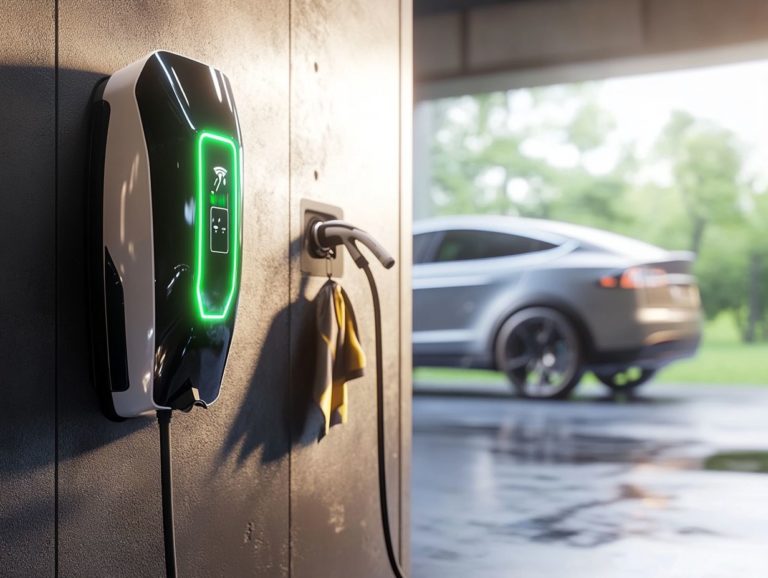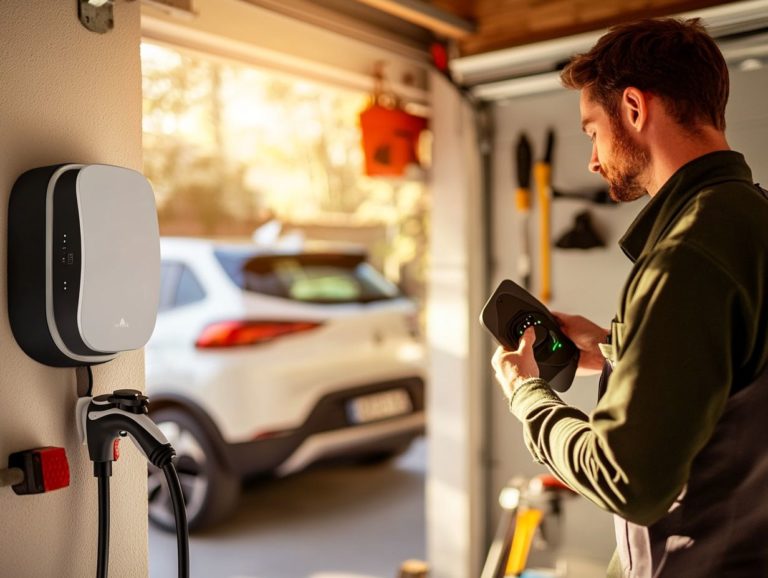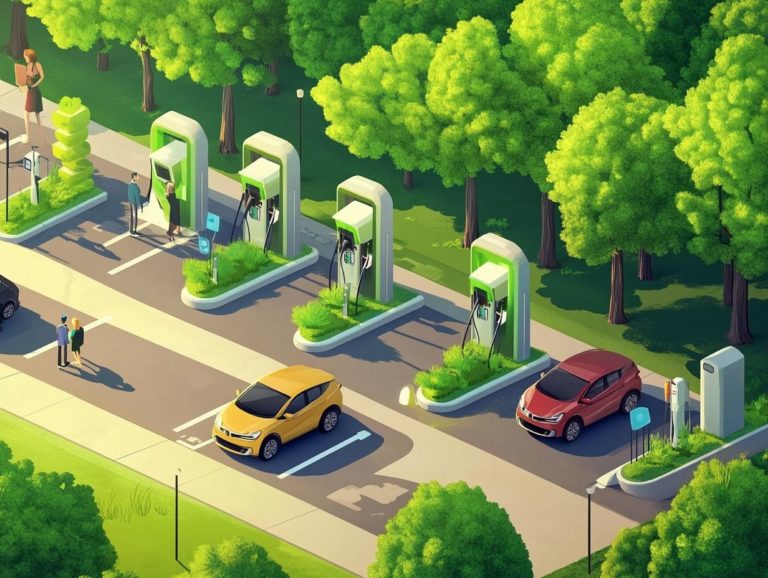What to Consider When Installing a Charger
As electric vehicles (EVs) gain traction and popularity, the demand for efficient and reliable charging solutions has reached a critical point.
Selecting the right charger involves careful consideration of various factors, such as your power supply, installation costs, and the specific needs of your vehicle.
This guide will unlock the secrets to choosing the perfect charger for your electric vehicle! You’ll discover valuable insights that empower you to make informed decisions.
Contents
- Key Takeaways:
- Explore the Different Types of EV Chargers
- Factors to Consider Before Installing a Charger
- Location and Accessibility
- Cost and Installation Process
- Choosing the Right Charger for Your Needs
- Matching Charger to Vehicle
- Installing the Charger
- Maintaining and Troubleshooting Your Charger
- Frequently Asked Questions
- What factors should I consider when installing a charger for my electric vehicle?
- Do I need to hire a professional for charger installation?
- Can I install a charger myself?
- Do I need a specific type of charger for my electric vehicle?
- Are there any safety considerations when installing a charger?
- Do I need to consider future needs when installing a charger?
Key Takeaways:
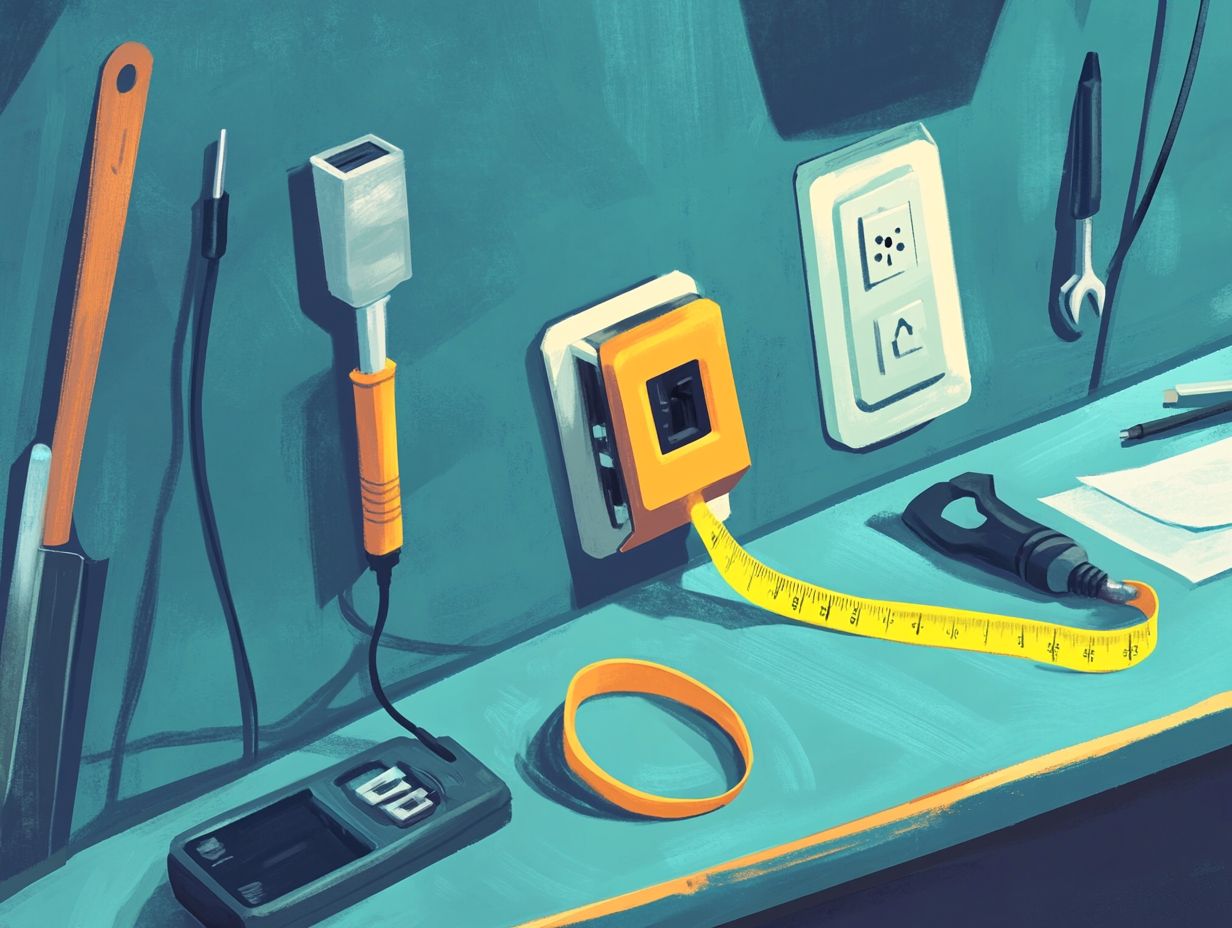
- Consider the power supply and capacity of the charger before installation.
- Identify the optimal location and accessibility for installing the charger.
- Choose the right charger by matching it to your vehicle’s specifications.
Explore the Different Types of EV Chargers
When exploring the array of chargers for electric vehicles (EVs), it s crucial to grasp the various options tailored to meet your specific needs.
The primary types include:
- Level 1 chargers, which generally rely on a standard 3-pin plug.
- Level 2 chargers, which provide a significant boost in charging speeds.
- Level 3 chargers, often referred to as DC Fast Chargers, for quick top-ups while on the move.
EV chargers like Pod Point offer innovative features that improve user-friendliness and efficiency, making your charging experience as seamless as possible.
Factors to Consider Before Installing a Charger
Before you dive into installing an EV charger, consider several critical factors to guarantee efficient and safe operation. Start by evaluating the power supply and the capacity of your electrical panel.
Next, pinpoint the optimal location for accessibility. Familiarize yourself with local safety rules to ensure everything is in order. By addressing these elements, you ll pave the way for a successful installation and ensure reliable service for your electric vehicle.
Power Supply and Capacity
Understanding the power supply and capacity requirements is essential when installing an EV charger. It significantly affects the charger s efficiency and reliability. Evaluate your panel s current load carefully.
Check the amperage rating of your panel. Generally, a Level 2 charger requires about 30 to 40 amps, while a Level 3 charger might demand up to 100 amps or more, depending on the specific model.
To determine if your panel can handle the new charger, consult with a trusted electrical contractor. They can perform a load calculation and advise if an upgrade is necessary. Always prioritize safety and ensure compliance with local safety rules.
Location and Accessibility
Finding the perfect spot for your EV charger can make charging a breeze. The location of your EV charger is crucial for ensuring ease of access and efficient charging, making it a key consideration during the installation planning process.
Ideally, your charging station should be positioned within a reasonable distance from where you typically park your vehicle, while remaining easily accessible for both personal and public use.
When selecting the right site, visibility matters; placing your charger in a well-lit, prominent area enhances security and encourages usage. Safety is paramount, so steer clear of locations prone to accidents or obstructions. Weather protection is also significant; installing the charger under a carport or awning not only shields it from the elements but also extends its lifespan.
Don t overlook potential cable management solutions; they can make a huge difference! A tidy setup not only prevents trip hazards but also promotes better organization and accessibility, making the charging experience smoother for you and others.
Cost and Installation Process
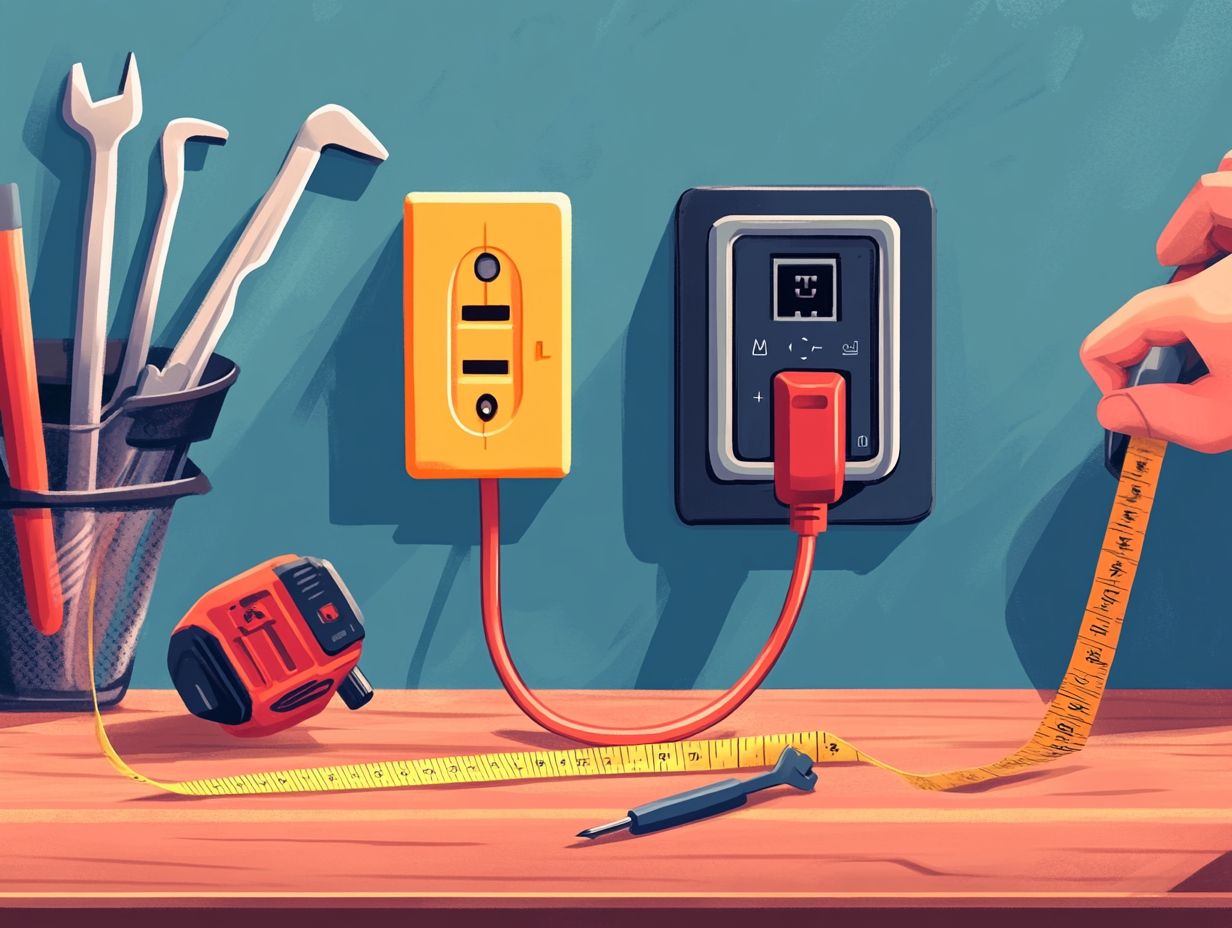
Understanding the cost and installation process of an EV charger is crucial for your budgeting and planning. Prices can vary significantly based on several factors, including the type of charger you select and how complicated the installation is.
These factors also encompass any potential permits or fees required to comply with local regulations.
Beyond the initial equipment costs which can range from a few hundred to several thousand dollars depending on the charger s specifications and features you should also factor in labor costs. This is especially relevant if your home requires electrical upgrades.
Check local and federal grants or incentives to help reduce these costs.
The installation process typically kicks off with an initial assessment, where a qualified electrician evaluates your site to determine the ideal placement for the charger. After that, you’ll likely need to secure necessary permits before installation can begin.
Once everything’s in place, the actual installation occurs, which may involve upgrades to your home s electrical panel or wiring, ending with a final check to make sure everything is safe.
Choosing the Right Charger for Your Needs
Choosing the right EV charger tailored to your specific needs is essential for enhancing your electric vehicle experience. Different chargers offer unique features designed for various vehicles and user preferences.
As you navigate your options, consider factors such as the type of electric vehicle you own, its charging capabilities, and the speed at which you prefer to charge. This careful consideration will ensure compatibility and efficiency, ultimately transforming your charging experience.
Matching Charger to Vehicle
Matching the right charger to your electric vehicle is essential for ensuring compatibility and optimal performance. You’ll want to consider the vehicle s charging requirements and the type of adapter necessary.
Verifying the specifications of both the charger and your EV is crucial to avoid any connection hiccups and to ensure that your vehicle can make the most of the charger’s capabilities.
By understanding your vehicle’s charging specifications, you can identify the voltage and amperage needed for efficient charging. Different EV models have distinct power demands, so being informed can make a world of difference.
Depending on the type of charger and your vehicle s inlet configuration, various adapters may be required. These play a significant role in influencing charging speeds. Using an incompatible adapter could lead to slower charging rates or even present safety risks.
It s crucial for electric vehicle owners to know the charger standards available, such as Type 1 or Type 2. Ensuring that your chosen charger effectively accommodates your vehicle’s battery management system is not just a good idea; it’s essential for a seamless charging experience.
Additional Features and Considerations
When considering additional features in an EV charger, incorporating smart technology can offer remarkable advantages. This enhances not just the charging experience but also the overall management of your electric vehicle. Advanced capabilities like remote monitoring, scheduled charging, and easy connection to a home energy management system can significantly enhance both the efficiency and convenience of your charging routine.
Safety certifications are important. They ensure that your charger operates reliably while protecting both your vehicle and yourself from electrical hazards. A well-connected charger facilitates easy connection with different apps, providing real-time updates that enrich your user experience.
Ease of maintenance is another key factor to consider. Chargers designed for straightforward upkeep can lead to fewer service interruptions, guaranteeing consistent performance over time. Together, these features enhance long-term reliability and create a more user-friendly experience, allowing you to fully enjoy the benefits of electric mobility.
Installing the Charger
Installing an EV charger is not just a simple task; it involves a meticulous process that requires careful planning and execution to comply with all relevant regulations and safety standards. Start your installation journey with a thorough assessment of your existing electrical systems.
This process includes obtaining the necessary permits and culminates in completing essential inspections. Taking these measures will set the stage for a successful installation.
Steps and Requirements

To successfully install an EV charger, follow several essential steps and requirements that ensure compliance with local regulations and safety standards. Start by assessing your existing electrical system, then determine the optimal placement for the charger.
Make sure to apply for the necessary permits and arrange for a qualified electrical contractor to handle the installation.
Each phase is crucial. Begin with a thorough evaluation of your current electrical infrastructure to confirm it can support the new charger. Choosing a strategic location for the charger is key; it will influence both convenience and the efficiency of charging.
Securing the appropriate permits is also critical, as they ensure your installation adheres to local codes. Inspections will typically follow to verify that everything meets regulatory guidelines. Engaging certified installers is essential. Their expertise guarantees safety and compliance with all requirements, giving you peace of mind that your charging station will operate efficiently and safely.
Maintaining and Troubleshooting Your Charger
Maintaining and troubleshooting your EV charger is essential for ensuring its longevity and optimal performance. This ultimately enhances your electric vehicle experience.
By conducting regular checks and promptly addressing common issues, you can prevent costly repairs and keep your charging station functioning at its best, ready to meet your needs whenever you require it.
Tips for Keeping Your Charger in Good Condition
- Implement regular maintenance tips for ensuring its reliability and performance over time.
- Conduct frequent inspections for signs of wear, damage, or loose connections.
- Clean the charging cable regularly to prevent issues.
- Ensure proper placement to avoid obstructions.
Make it a habit to regularly inspect the charger. Conduct evaluations at least quarterly, but consider more frequent checks during extreme weather seasons to mitigate potential issues.
Maintaining cleanliness around the charger is crucial. Remove any debris and dirt that could interfere with its functionality. Seasonal changes can affect charging performance too be vigilant about snow accumulation in winter and dirt or leaves in fall, as these can obstruct ventilation and lead to overheating.
Taking proper care not only safeguards your equipment but also ensures a smoother and safer charging experience. Stay ahead of potential issues and keep your EV charger in top shape!
Common Issues and How to Address Them
Identifying and addressing common issues with your EV charger can greatly enhance its performance and longevity, ensuring reliable access to charging. You may encounter connection errors, slow charging, or safety alerts. Knowing how to troubleshoot these issues can help you resolve them swiftly.
If you experience a connection error, it could be due to a faulty cable or an incompatible power source. A quick check for cable damage and ensuring the outlet is functioning properly could be all it takes.
If charging is taking longer than expected, consider your vehicle s charging capacity. Each EV has specific requirements that may affect charging time.
Safety alerts can signal overheating or electrical faults. In such cases, power down the unit and consult the manual for instructions.
If issues persist, contact customer support. Expert technicians are ready to provide personalized solutions, ensuring your charger operates at peak efficiency.
Frequently Asked Questions
What factors should I consider when installing a charger for my electric vehicle?
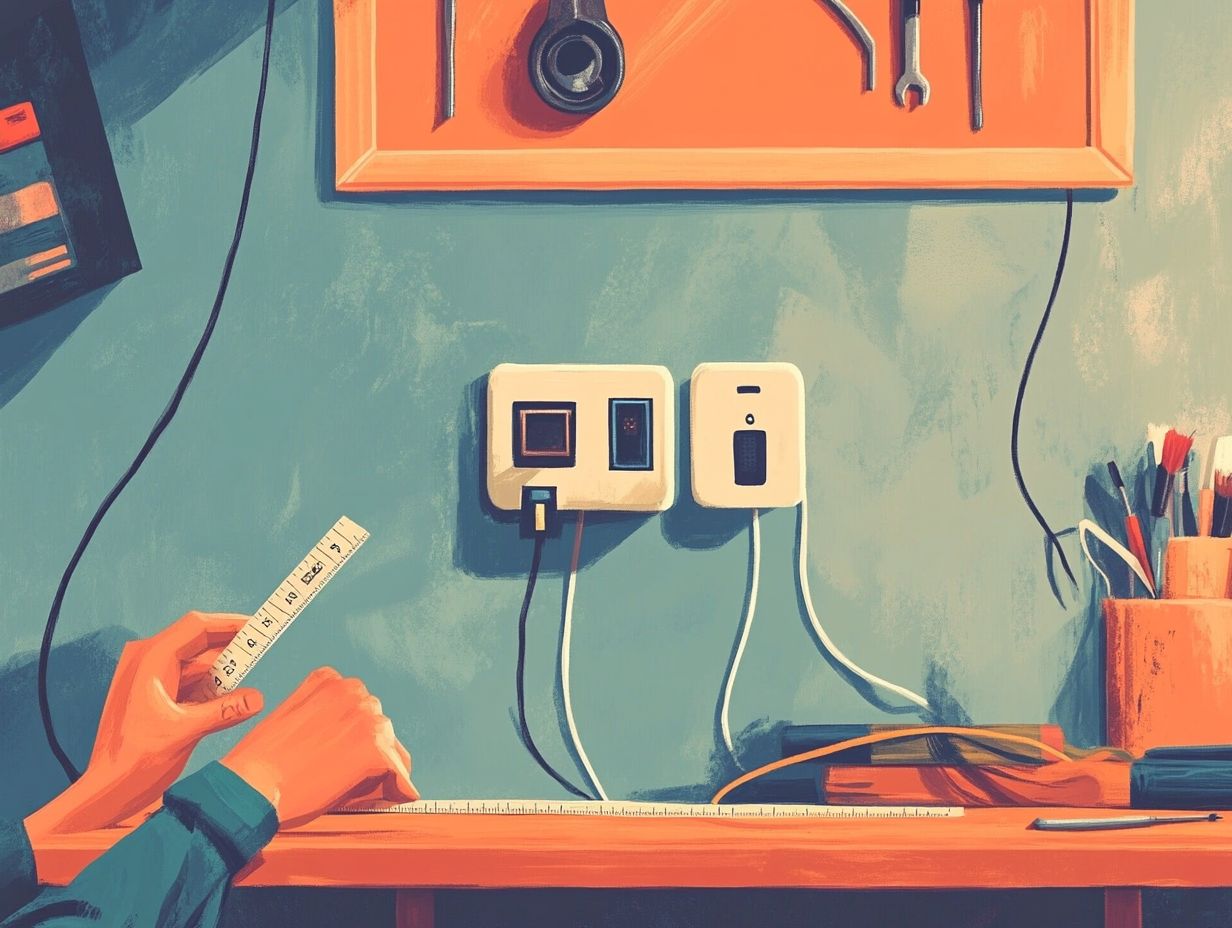
Important factors to consider include:
- Location and accessibility of the charger
- Voltage and power supply needed
- Permits or approvals from local authorities
Do I need to hire a professional for charger installation?
It is highly recommended to hire a professional electrician for installation to ensure safety and proper functioning. They can help determine the best location and power supply for your needs.
Can I install a charger myself?
While it is possible to install a charger yourself, it is not recommended unless you have experience in electrical work. Improper installation can be dangerous and may void warranties or insurance coverage.
Do I need a specific type of charger for my electric vehicle?
Yes, each electric vehicle may have different charging requirements. Research and choose a charger compatible with your make and model, considering charging speed and connector type.
Are there any safety considerations when installing a charger?
Yes, always follow safety guidelines and regulations during installation. This includes proper grounding and protection against electrical hazards. Regularly inspect and maintain the charger for potential issues.
Do I need to consider future needs when installing a charger?
Yes, plan for potential future needs by choosing a charger with higher power capacity or leaving room for additional chargers as your electric vehicle fleet grows.


